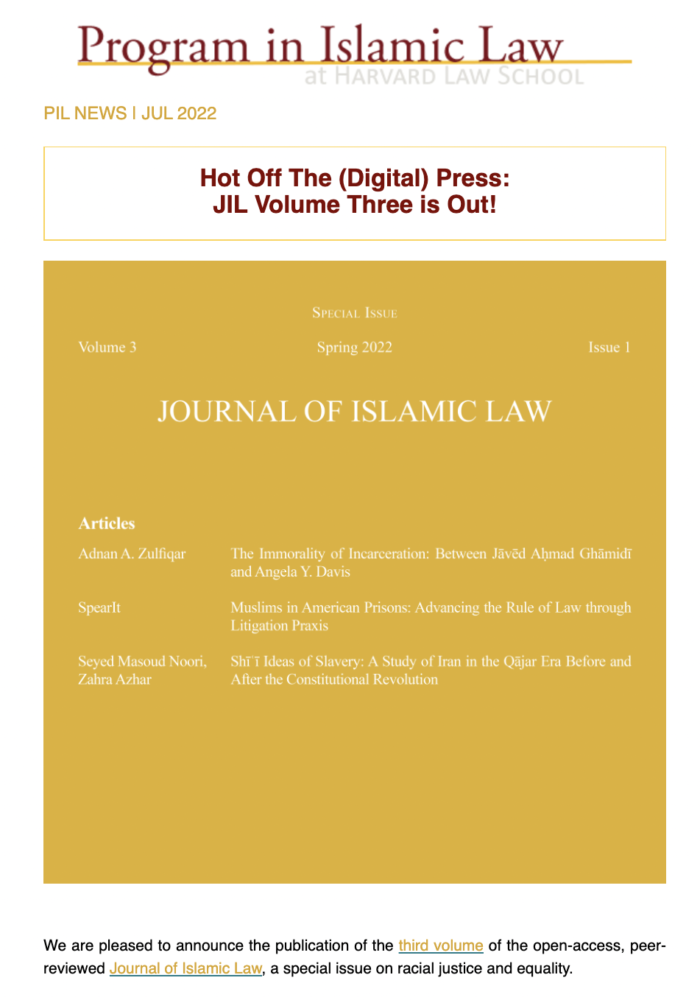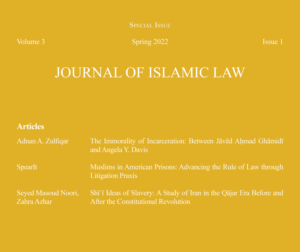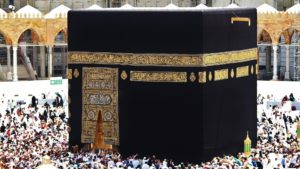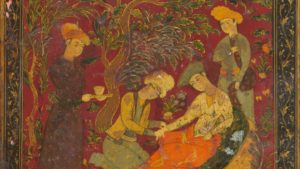
 Hot Off The (Digital) Press: JIL Volume Three is Out! We are pleased to announce the publication of the third volume of the open-access, peer-reviewed Journal of Islamic Law, a special issue on racial justice and equality. We invite you to digitally explore the third issue which started with one question: how do Islamic legal traditions, whether in theory or in practice, inform contemporary debates on racial justice and equality, particularly with the notable rise of mass incarceration? Exploring this question appeared to us critical in several respects. First, race continues to be a major fault line in today’s world—W. E. B. Dubois’s color line persists. Race also continues to affect the way Black people and other people of color—including many Muslims—are treated on a day-to-day basis. Second, the Black Lives Matter moment brought realist approaches to law out of law reviews and into the mainstream conversation through its focus on structural inequalities, mass incarceration, and the policing of communities of color and immigrants in the United States. No matter what law said it did, one had to look at what it actually did to affect (different segments of) society. Third, Muslims, be it in the United States or in the Global South, were not simply subjects or victims of the law or of its systems. We recognized that they are actors shaping the course of the developments in law and society that touch on racial equality, criminal justice, and equality; and they sometimes draw on Islamic traditions in doing so. We sought to examine how.
Hot Off The (Digital) Press: JIL Volume Three is Out! We are pleased to announce the publication of the third volume of the open-access, peer-reviewed Journal of Islamic Law, a special issue on racial justice and equality. We invite you to digitally explore the third issue which started with one question: how do Islamic legal traditions, whether in theory or in practice, inform contemporary debates on racial justice and equality, particularly with the notable rise of mass incarceration? Exploring this question appeared to us critical in several respects. First, race continues to be a major fault line in today’s world—W. E. B. Dubois’s color line persists. Race also continues to affect the way Black people and other people of color—including many Muslims—are treated on a day-to-day basis. Second, the Black Lives Matter moment brought realist approaches to law out of law reviews and into the mainstream conversation through its focus on structural inequalities, mass incarceration, and the policing of communities of color and immigrants in the United States. No matter what law said it did, one had to look at what it actually did to affect (different segments of) society. Third, Muslims, be it in the United States or in the Global South, were not simply subjects or victims of the law or of its systems. We recognized that they are actors shaping the course of the developments in law and society that touch on racial equality, criminal justice, and equality; and they sometimes draw on Islamic traditions in doing so. We sought to examine how.
 CONTENT: Ḥajj 1443H/2022AD As part of its growing archive of contemporary fatwās and related materials SHARIAsource, features the documents giving voice to the recent decision in Saudi Arabia to assume full control over Ḥajj, the annual Islamic pilgrimage in commemoration of the rites of Abraham, his wife Hagar, and the would-be sacrifice of their son Ishmael. The Kingdom’s Ministry of Hajj and Umrah issued the decision on 6 June 2022, only weeks before hajj season, to require hajj pilgrims from Europe, America, and Australia for this year’s hajj (1443H/2022AD) to petition individually rather than in groups via a new lottery system and to use their portal exclusively, rather than arrange their trips through the local groups that ordinarily lead, educate, and organize tours for Muslims in the West. The Saudi portal is meant to enable visa processing and monitor COVID-19 protocols. We’ve recently added the decision to our portal, and rounded up news about the difficulties that pilgrims faced this year as a result (see our blog’s weekly roundup). Explore them today!
CONTENT: Ḥajj 1443H/2022AD As part of its growing archive of contemporary fatwās and related materials SHARIAsource, features the documents giving voice to the recent decision in Saudi Arabia to assume full control over Ḥajj, the annual Islamic pilgrimage in commemoration of the rites of Abraham, his wife Hagar, and the would-be sacrifice of their son Ishmael. The Kingdom’s Ministry of Hajj and Umrah issued the decision on 6 June 2022, only weeks before hajj season, to require hajj pilgrims from Europe, America, and Australia for this year’s hajj (1443H/2022AD) to petition individually rather than in groups via a new lottery system and to use their portal exclusively, rather than arrange their trips through the local groups that ordinarily lead, educate, and organize tours for Muslims in the West. The Saudi portal is meant to enable visa processing and monitor COVID-19 protocols. We’ve recently added the decision to our portal, and rounded up news about the difficulties that pilgrims faced this year as a result (see our blog’s weekly roundup). Explore them today! CONTEXT: Abortion and Islamic Law As the recent Supreme Court decision made headlines in the United States for removing a constitutional right to abortion, discussions on Islamic legal perspectives on abortion rose to the surface around the world. The tenor of the debates has meant that arguments from Islamic law occasionally appear in difficult conversations about abortion and when life begins as a matter of American constitutional law, and in related discussions internal to the Islamic tradition; there is range of opinions on abortion and life in Islamic law. The Islamic Law Blog has curated a Resource Roundup: Abortion and Islamic Law, a collection of resources meant to shed light on the diversity of arguments in Islamic law and for consideration or comparison to religious law aspects of the debate on the controversy over abortion and the start of life among Muslims. These resources help inform the understanding of Islamic law on its own, and may be relevant to American law at the intersection of religious liberty and free exercise in the current constitutional row.
CONTEXT: Abortion and Islamic Law As the recent Supreme Court decision made headlines in the United States for removing a constitutional right to abortion, discussions on Islamic legal perspectives on abortion rose to the surface around the world. The tenor of the debates has meant that arguments from Islamic law occasionally appear in difficult conversations about abortion and when life begins as a matter of American constitutional law, and in related discussions internal to the Islamic tradition; there is range of opinions on abortion and life in Islamic law. The Islamic Law Blog has curated a Resource Roundup: Abortion and Islamic Law, a collection of resources meant to shed light on the diversity of arguments in Islamic law and for consideration or comparison to religious law aspects of the debate on the controversy over abortion and the start of life among Muslims. These resources help inform the understanding of Islamic law on its own, and may be relevant to American law at the intersection of religious liberty and free exercise in the current constitutional row.
See the full newsletter.

